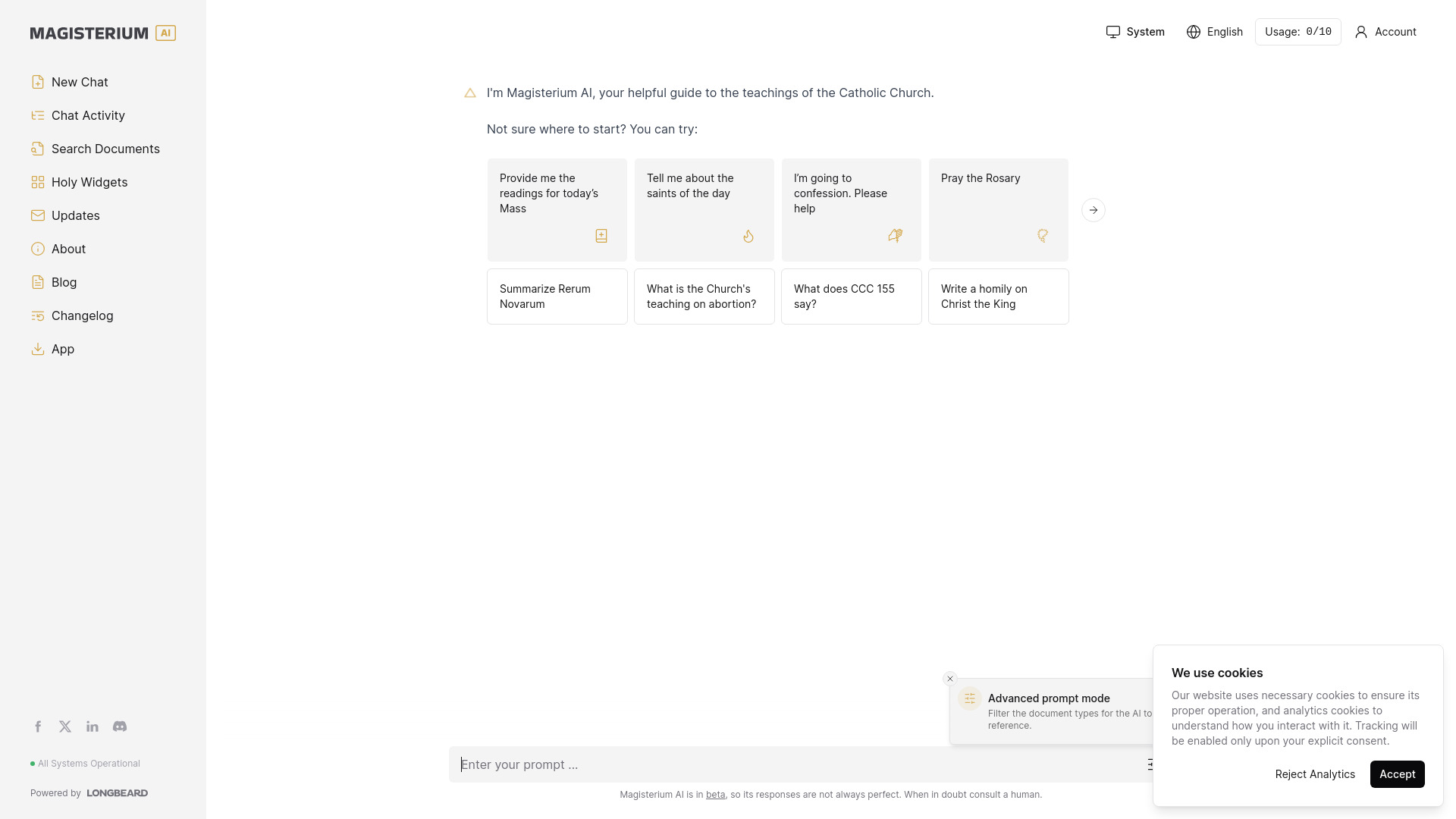
Magisterium
Open Website-
Tool Introduction:Authoritative Catholic answers with citations—chat, source library, widgets.
-
Inclusion Date:Oct 21, 2025
-
Social Media & Email:
Tool Information
What is Magisterium AI
Magisterium AI is an answer engine for the Catholic Church that delivers concise, cited responses drawn from the Magisterium, the Bible, and the Fathers of the Church. Designed for trustworthy theological research, catechesis, and apologetics, it surfaces original texts with clear references so users can verify every claim. Beyond a conversational interface, it includes access to a source library, chat activity history, “holy widgets” for devotional context, news updates related to Church documents, and an app API. It emphasizes privacy, using cookies only for core operation and analytics with explicit user consent.
Magisterium AI Key Features
- Cited answers: Provides responses anchored in the Magisterium, Scripture, and the Church Fathers with precise references.
- Conversational search: Chat-based queries that refine understanding and surface relevant passages.
- Source library access: Explore primary documents and open citations directly for verification.
- Chat activity: Review and manage your past questions and threads for easy recall.
- Holy widgets: Handy widgets that bring devotional and contextual information alongside research.
- News updates: Stay informed about notable Church texts and relevant developments.
- App API: Integrate cited Catholic answers into apps, websites, or internal tools.
- Privacy-first analytics: Cookies are used for essential operation; analytics run only with explicit consent.
- Verification workflow: Open sources from within answers to validate meaning and context.
Who Should Use Magisterium AI
Ideal for clergy, theologians, catechists, apologists, Catholic educators, seminarians, and students who need authoritative references. Catholic media teams, parish staff, and lay faithful seeking reliable teachings can use it for research, curriculum planning, homily prep, RCIA formation, and faith study with verifiable sources.
How to Use Magisterium AI
- Create an account and adjust consent settings for cookies and analytics.
- Start a new chat and enter your question about Catholic doctrine, Scripture, or tradition.
- Review the answer and examine the cited sources from the Magisterium, Bible, or Church Fathers.
- Open source documents from the library to read passages in context.
- Save, organize, or revisit your chat activity for ongoing study.
- Explore holy widgets and news updates to enrich your research workflow.
- Use the app API to embed cited answers in your app or website if integration is needed.
Magisterium AI Industry Use Cases
Diocesan offices streamline catechetical materials by pulling cited paragraphs from official documents. Catholic schools and seminaries build lesson plans with verifiable references. Publishers and media teams fact-check articles against primary sources. Parish staff prepare homilies and catechesis with quick access to Church teaching. Developers embed a Q&A experience via the API inside parish or ministry apps to support faithful, referenced answers.
Magisterium AI Pros and Cons
Pros:
- Authoritative, citation-focused answers rooted in Catholic sources.
- Efficient research via conversational search and source library access.
- Clear verification path from summary to primary texts.
- API enables integration into websites and apps.
- Privacy-conscious design with explicit consent for analytics.
Cons:
- Best suited to Catholic content; coverage outside that domain may be limited.
- Contextual nuances still require human theological judgment.
- Access to some materials or features may depend on account settings or plan.
- Requires internet connectivity for full functionality.
Magisterium AI FAQs
-
Does Magisterium AI replace a priest or theologian?
No. It accelerates research by providing cited sources, but interpretation and pastoral judgment remain human responsibilities.
-
What sources does it cite?
It draws from the Magisterium, the Bible, and the Fathers of the Church, presenting references so users can verify context.
-
How does Magisterium AI handle privacy and cookies?
Cookies support essential operation. Analytics are collected only with explicit user consent, aligning with a privacy-first approach.
-
Is there an API for developers?
Yes. An app API allows teams to integrate cited Catholic answers into digital products and workflows.



